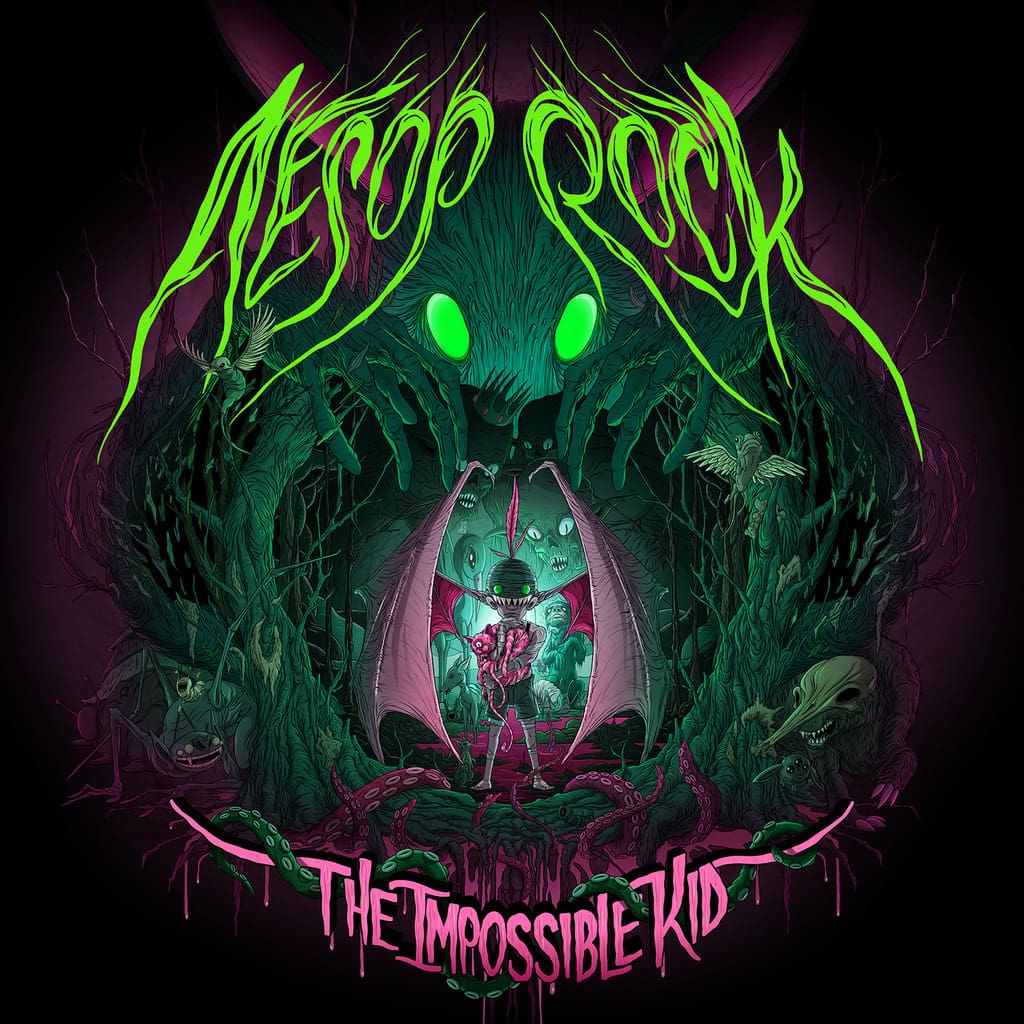
Aesop Rock has built his career on his massive vocabulary, abstract wordplay, and a talent for taking the mundane and making it sound deep and complex. Over the years, he’s experimented with his style and became more hands-on with his production. He jumped into projects with unlikely collaborators like Kimya Dawson and John Darnielle (of The Mountain Goats). He gets more and more personal with his writing as he goes. His newest album, The Impossible Kid, finds one of the most unique independent rappers for the past two decades coming to terms in a new way with the fact that he’s been one of the most unique independent rappers for the past two decades.
Aesop takes on an entirely new perspective with this album, delivering his most grounded and personal album to date. On “Lotta Years” he speaks about observing young people with bad neck tattoos and removable dreadlocks. He questions his place in the future, in relation to a generation whose ideas of art and rap music are entirely different from his when he started out. A few songs later on “Blood Sandwich” he addresses two stories, one about each of his two brothers. In the first, he recounts a little league game that gets derailed by a burrowing rodent. The second is about his religious mother refusing to let his older brother attend a Ministry concert because she detects satanic influences. In classic Aesop style, the connection between these stories, and the insinuation that Aesop hasn’t spoken to his older brother for a while, isn’t initially clear. However, by painting these little vignettes, he’s really trying to put forward a clearer idea of where he came from and how that affected who he is now.
“Shrunk” details a psychiatric visit. “Dorks” is a shrugging acceptance of Aesop’s outsider status. “Kirby” tells the story of his recent decision to get a kitten at the suggestion of his psychiatrist. “Rings” laments the fact that he doesn’t do much drawing anymore. He raps that it’s “hard to admit that I used to draw.” These moments describe an Aesop Rock who, at some level, is actively trying to pull down the walls that previously existed between his life and what he puts on his records. As a whole, it makes the album easier to relate to. At least, it gives it an approachable human quality.
The human aspect actually saves the album from feeling a little bit one-note. Aesop produced the entirety of The Impossible Kid, and while his ear has improved over his career, the album does fall prey to a lot of the same pitfalls as his production with Hail Mary Mallon on Bestiary. It feels a little rigid and harsh at times, focused more on strong and punchy quarter note rhythms than on building an atmosphere and giving the tracks interesting textures. Granted, there’s a noticeable effort made to smooth the production over, but it’s often hit-or-miss. Alternately, Aesop’s rapping technique has been consistent for the past few years, but it hasn’t shown too much evolution and can feel stale at times. The engaging and honest nature of the writing certainly helps to gloss over the album’s faults even if it doesn’t totally fix them.
Impossible Kid does have production gems here and there. “Defender” is a surprisingly ethereal track with some more nuanced drums and a smooth bass/synth combination. It has a cheesy DJ sting or two, but it’s forgivable in the greater mix. “Get Out Of The Car” cuts out the beat altogether and lets Aesop’s percussive vocals work to give the track a strong rhythm. It’s a smart choice that highlights the weight of his message on the track. You can hear that he wrote the verse to include plenty of piercing consonants to give it a rhythm. Above all, there’s poetry on the track. Word choice and delivery just proves how much he deserves the respect he’s gained.
If nothing else, Aesop Rock has always delivered tight verses that keep you hovering over the rewind button the whole time. His delivery on this album follows suit with toothy diction, quick-fire imagery, and chuckle-inducing punchlines (“Cherry? No. Whip? Yes.”). For those who go in for Aesop’s unique flow and intellectual “wordsmith-ery”, The Impossible Kid is a satisfying addition to his body of work. The album does have something going on at a deeper level. It’s less about the state of the rap game or the state of the world, and more about the state of Aesop Rock himself than anything else in his catalog. For all of the record’s faults, Aesop’s attempt to write in a less guarded way is ultimately a success. The Impossible Kid carves out a truly unique spot for itself within his discography.
Rating: B
Photo Credit:fifth element online.com & mtv.com

